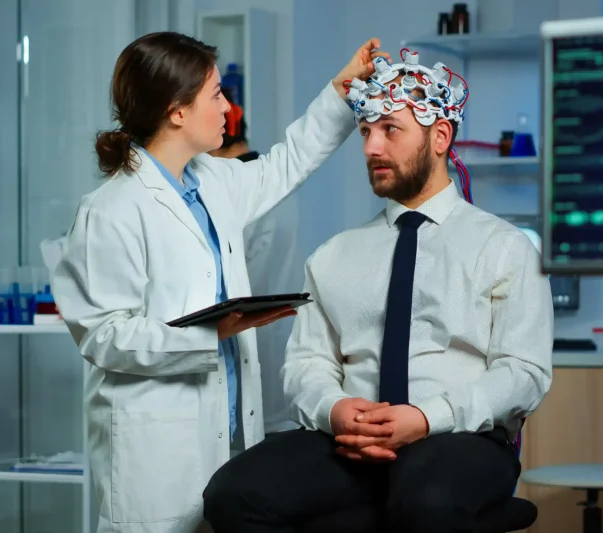The symptoms of a traumatic brain injury, also known as a TBI, can vary dramatically depending on the person, the injury, and how the injury occurred. For example, symptoms of a mild injury can include lethargy, a change in senses, and fatigue. A more serious injury can often include unconsciousness, tingling, numbness, and sometimes vomiting or sustained pupil dilation.
If you experience a traumatic brain injury because of an accident caused by someone else’s negligence, you may have legal rights to recover financial compensation. The TBI injury settlement you recover could pay for your medical bills, future treatments, lost income, and personal pain and suffering.
At Olson Personal Injury Lawyers, our Denver traumatic brain injury lawyers have decades of combined experience fighting and finding justice to get you the compensation you deserve in Colorado. Call (970) 633-3673 or contact us online today for a free, no-obligation consultation over the phone or in person at our local office.
Traumatic Brain Injuries Are a Major Health Risk
Brain injuries are always serious. But, more importantly, traumatic brain injuries are a major health concern in the United States.
According to the Centers for Disease Control and Prevention, 1.7 million Americans sustain TBIs each year. What makes matters worse is that 275,000 brain injury victims of those 1.7 million require hospitalization due to the severity of their injuries. In addition, brain injuries are responsible for more than 50,000 deaths a year in the United States. In Colorado alone, there were 3,776 TBI-related deaths.
Regardless of how severe the symptoms might be, a traumatic brain injury victim must see a doctor as soon as possible. Medical professionals will perform an evaluation to determine the severity of your injury. While symptoms can appear mild, it is impossible to identify traumatic brain injuries without the consultation of a medical professional. If you find that you possibly suffered injuries after a car accident, no matter how mild they appear or feel, you should seek medical attention as soon as possible and call your legal team.
Common Symptoms of a Traumatic Brain Injury
The human brain is a deeply complex organ, but any time there is an event that causes a violent jolt to the head, it can lead to a brain injury. Unfortunately, even with our medical advancements diagnosing brain injuries can still be difficult. Brain injury symptoms are not the same for everyone, sometimes varying wildly. What makes matters worse is that those symptoms are not necessarily present immediately after injury. Depending on the patient, it can take symptoms days or weeks to appear.
Patients with traumatic brain injuries encounter a unique combination of physical, sensory, cognitive, and behavioral symptoms. Depending on the severity of their injury, it can be anything from mild headaches to the inability to wake up from sleeping. In addition, symptoms can vary depending on the part of the brain that was affected by the injury.
Due to the complexities of the traumatic brain injury symptoms, only a qualified medical professional can diagnose the injury.
Mild Traumatic Brain Injuries
Victims who suffer from a mild traumatic brain injury may see various symptoms emerge that mark medical changes since the accident. Symptoms are broken down into physical, sensory, or cognitive issues.
While not covering all possible symptoms, the most common mild traumatic brain injury symptoms are below:
- Headaches
- Nausea, including vomiting
- Loss of balance or difficulty balancing
- Lethargy and Fatigue
- Change in senses, like blurry vision and ringing in the ears
- Sensitivity to bright lights
- Quick loss of consciousness or memory loss
- Mood swings and depression episodes
Severe Traumatic Brain Injuries
When the injury to the brain is severe, it can include all of the symptoms of a mild traumatic brain injury, along with other more-concerning signs.
The most common sign of a severe brain injury is the loss of consciousness for an extended period of time. With significant brain injuries, the symptoms will vary considerably based on the specific case. However, symptoms will present themselves as soon as the first few hours after an accident, unlike mild cases of TBIs. Victims diagnosed with severe traumatic brain injuries usually require ongoing care to help recover.
Some of the most common symptoms of a major brain injury include the following:
- Loss of consciousness for an extended period or the victim entering into a coma
- Severe headaches that are persistent and worsen over time
- Constant episodes of nausea and vomiting
- Blurred vision and pupil dilation of one or both eyes
- Clear fluids excreting from the nose and ears
- Slurred speech
- Tingling or numbness in fingers and toes
- Seizures and other cognitive impairments
Traumatic Brain Injuries in Children
Children are especially at risk of traumatic brain injuries in a car accident. But, more importantly, because children are still developing and reaching milestones, their injuries can impact their future much more significantly than an adult.
Unfortunately, children are often unable to communicate or describe their symptoms adequately. Children experience symptoms as well that are similar to adults. Those symptoms are as follows:
- Change in eating or nursing habits
- Unusual or easily provoked irritability with persistent crying and an inability to be consoled
- Changes in sleep habits or increased drowsiness
- Seizures, when the child has never had seizures before
- Change in ability to pay attention, even when engaged in things that normally interest them
- Sad or depressed mood or displaying a loss of interest in favorite toys or activities
Types of Tests Possible to Find a TBI Diagnosis
There is a series of exams that medical teams may perform when there is suspicion of a traumatic brain injury. Often they will start with the Glasgow Coma Scale. This 15-point exam assists doctors and medical teams in understanding a brain injury’s potential severity. They test everything from coherent speech to the ability to move one’s extremities.
Medical teams may ask a series of questions relating to how the injury happened and any symptoms the victim is feeling. Some examples of the kind of questions you may be asked are:
- What was the event that caused this injury, and when?
- Were you whipped around during the accident? Can you describe the force of the injury? For example, did you strike against the vehicle interior?
- Did you specifically hit your head when it happened?
- At any point, was there a loss of consciousness? And, if so, for how long?
Medical teams will proceed to perform a series of exams. The two most common tests are computerized tomography scans (also known as CT scans) and Magnetic resonance imaging scans (MRIs).
CT scans are usually performed first in emergency rooms. These scans can capture blood clots, fractures, bruised brain tissues, and brain tissue swelling. MRIs, on the other hand, use powerful radio waves and magnets to create a detailed brain image. MRIs allow the medical team to see improvements in the brain once treatment starts. If you are diagnosed with a traumatic brain injury, it may be possible that CT scans and MRIs are administered throughout your road to recovery.
Without exception, severe TBIs are a medical emergency. So, victims should always seek medical attention as soon as a sudden blow occurs or symptoms are present and before a traumatic brain injury is suspected.
Brain Injuries Often Come With a Delayed Onset
It happens quite often that a victim of a traumatic brain injury assumes they can overcome the symptoms they are experiencing without needing medical treatment. Unfortunately, this is often a false indicator because the worst effects of brain injuries often come with a delayed onset.
The symptoms may take a few days or even weeks to appear. What may seem like a relatively minor head injury can be far more severe than most realize. In some cases, medical intervention is delayed because victims will only seek medical attention once they realize the symptoms are more serious than they initially appeared. Delaying treatment can increase the risk of permanent side effects, including cognitive impairment.
In many cases, traumatic brain injury victims feel worse 48 hours after the car accident than they did immediately after. All brain injuries require a professional medical evaluation for this and other reasons. There is no doubt that when it comes to traumatic brain injuries, early intervention is the best way to protect the health and well-being of the victim.
Contact a Denver Traumatic Brain Injury Lawyer Today
A major accident is already a difficult situation to find oneself in. It is even worse if there are injuries or you suspect that you may have had a traumatic brain injury. If you or a loved one has sustained a brain injury, you must seek professional medical assistance as soon as possible. You can also benefit from reaching out to a legal team who can assist you with seeking compensation from all at-fault parties.
At the Olson Personal Injury Lawyers, we take personal injuries seriously. Our Denver brain injury lawyers dedicate ourselves to protecting injured victims’ rights and fighting to get them the compensation they deserve. If you or a loved one sustained a severe brain injury, don’t wait and reach out to us. Let us help you.
Are you ready to set up your free, no-obligation consultation? Call (970) 633-3673 or contact us online to reach our law firm today if you have been in an accident involving a TBI. We would be happy to take some time to review your claim and explain your legal options to you at our local Denver office.







